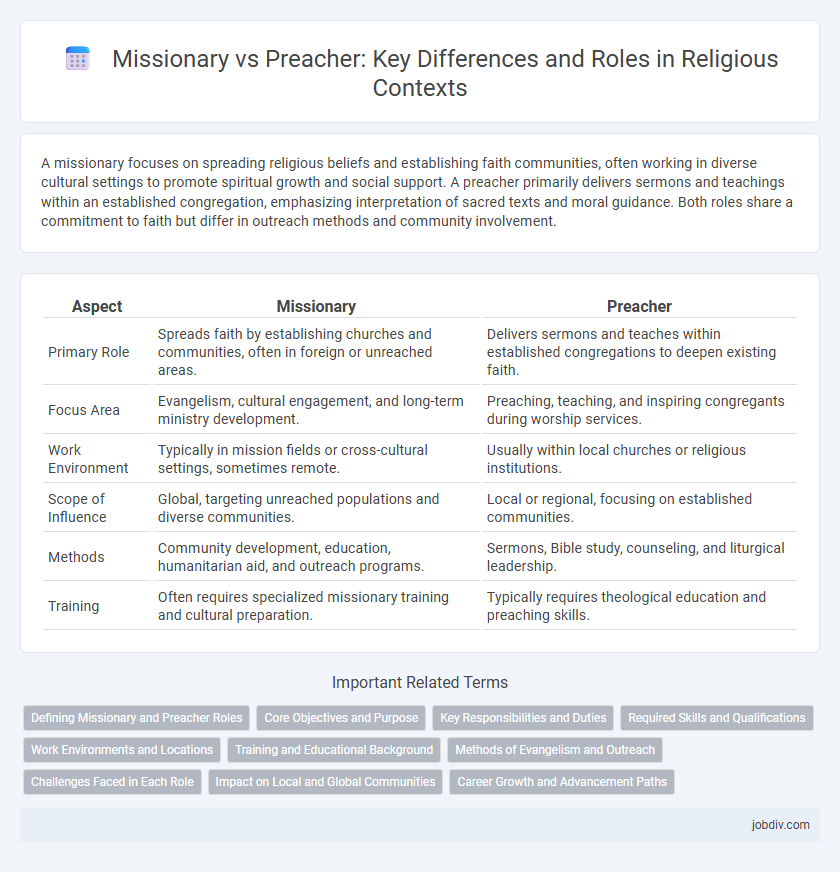A missionary focuses on spreading religious beliefs and establishing faith communities, often working in diverse cultural settings to promote spiritual growth and social support. A preacher primarily delivers sermons and teachings within an established congregation, emphasizing interpretation of sacred texts and moral guidance. Both roles share a commitment to faith but differ in outreach methods and community involvement.
Table of Comparison
| Aspect | Missionary | Preacher |
|---|---|---|
| Primary Role | Spreads faith by establishing churches and communities, often in foreign or unreached areas. | Delivers sermons and teaches within established congregations to deepen existing faith. |
| Focus Area | Evangelism, cultural engagement, and long-term ministry development. | Preaching, teaching, and inspiring congregants during worship services. |
| Work Environment | Typically in mission fields or cross-cultural settings, sometimes remote. | Usually within local churches or religious institutions. |
| Scope of Influence | Global, targeting unreached populations and diverse communities. | Local or regional, focusing on established communities. |
| Methods | Community development, education, humanitarian aid, and outreach programs. | Sermons, Bible study, counseling, and liturgical leadership. |
| Training | Often requires specialized missionary training and cultural preparation. | Typically requires theological education and preaching skills. |
Defining Missionary and Preacher Roles
Missionaries primarily undertake long-term efforts to spread religious beliefs and establish faith communities in new or unreached regions, often engaging in humanitarian work and cultural exchange. Preachers focus on delivering sermons and teaching within established congregations to inspire and guide spiritual growth. Both roles are essential for religious outreach but differ in scope, with missionaries emphasizing evangelism and community building, while preachers concentrate on doctrinal instruction and worship leadership.
Core Objectives and Purpose
Missionaries focus on spreading their faith through cultural immersion and humanitarian efforts, aiming to establish long-term community transformation. Preachers primarily deliver sermons to provide spiritual guidance and reinforce doctrinal teachings within established congregations. Both roles share the core objective of promoting religious beliefs but differ in method and scope of outreach.
Key Responsibilities and Duties
Missionaries primarily focus on spreading their faith through establishing communities, providing humanitarian aid, and engaging in cross-cultural evangelism in foreign or unreached areas. Preachers emphasize delivering sermons, teaching doctrine, and guiding congregational worship within established churches or religious gatherings. Both roles involve spiritual leadership, but missionaries often combine evangelism with service projects, while preachers center on pastoral care and religious instruction.
Required Skills and Qualifications
Missionaries require cross-cultural communication skills, language proficiency, and adaptability to diverse environments, often holding formal theological education or training in missiology. Preachers focus on strong public speaking abilities, deep scriptural knowledge, and pastoral care skills, typically obtained through seminary education and ordination. Both roles demand spiritual maturity, empathy, and a commitment to religious teachings, but missionaries emphasize outreach and cultural immersion, while preachers concentrate on delivering sermons and congregational leadership.
Work Environments and Locations
Missionaries typically work in diverse international settings, often in remote or underserved communities, focusing on establishing long-term relationships and cultural integration to spread religious teachings. Preachers primarily serve within established local congregations, such as churches or religious centers, delivering sermons and leading worship services in familiar environments. Both roles demand adaptability, but missionaries frequently face more challenging logistical and cultural conditions compared to preachers who operate in stable, institutional contexts.
Training and Educational Background
Missionaries typically undergo extensive cross-cultural training and theological education to prepare for effective outreach and community development in diverse global contexts. Preachers often receive formal theological degrees or seminary training emphasizing public speaking, scriptural interpretation, and pastoral care within established religious institutions. Both roles prioritize foundational biblical knowledge, but missionaries require specialized skills in language acquisition and cultural adaptability.
Methods of Evangelism and Outreach
Missionaries often immerse themselves in local cultures, using relational and contextual methods such as community development, education, and humanitarian aid to share the gospel effectively. Preachers primarily focus on delivering scripted sermons or messages within church settings or public gatherings, emphasizing verbal proclamation and invitation for conversion. Both methods aim to spread religious teachings but differ in approach: missionaries prioritize long-term cultural engagement while preachers emphasize structured oral proclamation.
Challenges Faced in Each Role
Missionaries often encounter cultural and language barriers that challenge their efforts to share religious beliefs in diverse communities, requiring adaptability and deep cultural understanding. Preachers face the difficulty of engaging and inspiring a congregation within a structured setting, often needing strong rhetorical skills and emotional intelligence to address varied spiritual needs. Both roles demand resilience and unwavering commitment amid social resistance, logistical constraints, and personal sacrifices.
Impact on Local and Global Communities
Missionaries actively engage in cross-cultural outreach, fostering sustainable development and education in local communities while spreading religious teachings globally. Preachers primarily focus on delivering sermons and spiritual guidance within congregations, strengthening faith and moral values locally. The combined efforts of missionaries and preachers amplify the religious impact by addressing both immediate community needs and broader evangelistic goals worldwide.
Career Growth and Advancement Paths
Missionary careers typically involve cross-cultural outreach and community development, offering opportunities for international experience and leadership roles within global religious organizations. Preachers often focus on congregational leadership, pastoral care, and sermon delivery, with advancement paths leading to senior pastoral roles, denominational leadership, or theological education positions. Both paths require strong communication skills, theological knowledge, and dedication, but missionaries may experience broader geographic mobility while preachers emphasize deep community engagement.
Missionary vs Preacher Infographic

 jobdiv.com
jobdiv.com